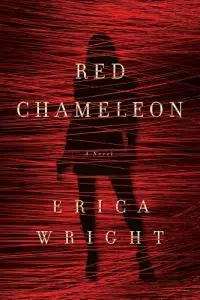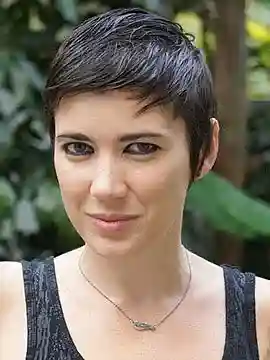Much like the protagonist of her Kat Stone mystery series, Erica Wright is a chameleon. One day she’s a poet, the next, a crime fiction writer. And now there’s a non-fiction book about snakes in the works… So maybe it’s safer to say that she’s more of a maverick, embracing multiple genres, refusing to be bound by convention or put in a box, staying true to her own aesthetic all the way through.
This month, she’s back to crime fiction, with her latest mystery, The Blue Kingfisher, hitting shelves. On the heels of The Red Chameleon and The Granite Moth, The Blue Kingfisher follows private investigator Kat Stone as the discovery of a body at the top of a lighthouse leads her down another rabbit hole, replete with varied and unpredictable characters and, oh yeah, jellyfish. Perhaps that’s where the crime writer, the poet, and the naturalist collide. In all, it makes for an absorbing, and surprising, read, just as we’ve come to except from Wright.
The Blue Kingfisher is the third in a series of novels featuring private investigator Kat Stone, preceded by The Red Chameleon and The Granite Moth. At this very moment, I’m wrapping up the third novel in a trilogy myself, and I can tell you it’s been challenging. Were there any particular challenges you faced with this third book? Any highs or lows you stumbled into that define writing a series?
The characters feel like real people, and I enjoy diving back into their lives, seeing what they’re up to. For me, the trickiest decision is deciding how much time has passed between books. There’s the Sue Grafton approach where Kinsey Millhone stays more or less the same age, and then there’s the Kathy Reichs approach where her Temperance Brennan gets older. I’m attached to my protagonist in her late twenties. I like that she’s smart and resourceful, but has room to grow. So I’m moving the clock slowly forward. The Blue Kingfisher takes place about six months after the events of The Granite Moth conclude.
Kat Stone is one of my favorite P.I.s of all time. Maybe it’s all the wigs, giving off such an Elizabeth Jennings (Keri Russell in The Americans) vibe, or maybe it’s just that Stone is such a fresh new voice in a genre that can often be weighed down by the same old detective tropes. What do you think makes your protagonist so unique? Have you ever stopped to compare her to other fictional investigators?
That’s so kind of you to say. Kat came to me before I’d written a single word. She was born out of colliding magazine and newspaper articles, you might say. I was teaching English at John Jay College of Criminal Justice at the time, and started researching the various careers my students were pursuing. That lead me to statistics on undercover work—divorce rates, prevalence of mental illness—and I started thinking about the repercussions of pretending to be someone else as your job. Around the same time, I read Oliver Sacks’s piece in The New Yorker about face blindness, a condition in which you don’t recognize people you know, sometimes not even close friends. Could the opposite be possible? Could someone’s appearance seem to shift depending on the light or, yes, wig? Kat walked into my head and set up residence.
I mentioned the wigs because being a master of disguise has been Kat Stone’s calling card for her past two books. In The Blue Kingfisher, however, we see more of Stone’s true self and delve deeper into her character and her past. Do you think this third installment is an emotional leap for Stone? And, from an author’s perspective, was it easier or harder to get this close to your protagonist?
In some ways, it’s a relief for Kat, but she definitely misses the escape provided by her disguises. To be honest, I missed writing those costume scenes, as well. In general, Kat has more bravado as a character than as herself. But what I really enjoyed exploring in this installment was Kat discovering and embracing her own strengths. She makes some choices that might not be palatable, but she’s being proactive rather than reactive. She’s trying to save her own neck. Kat’s less of a loner, but somehow more independent by the end of The Blue Kingfisher.
As with your previous novels, The Blue Kingfisher is full of twists and turns that take us from immigrant communities to the art world to deep sea fishing. How much research do you do in writing a novel? Is there anything unusual in The Blue Kingfisher that readers would be surprised to know you were already familiar with before the research process?
This novel took me longer to write than the previous two, so I spent some time researching what was actually happening in April of 2014. I’d forgotten that there were protests against President Obama’s immigration policies, and I added a scene that now seems almost quaint given how draconian U.S. immigration policies have become since then. A lot of information I found about immigration didn’t make it into the final version, though, because I wanted to avoid making Kat, well, psychic. While it might be satisfying to have her holding forth on how much worse things could get, that wouldn’t be realistic for the character. In terms of what I already knew? Well, I knew burial plots in New York City aren’t cheap!
 In addition to being a crime writer with your Kat Stone series, you are an accomplished poet with three collections to your name. How do you balance writing in these two genres that would seem to be polar opposites? Or do they perhaps have more in common than most people think?
In addition to being a crime writer with your Kat Stone series, you are an accomplished poet with three collections to your name. How do you balance writing in these two genres that would seem to be polar opposites? Or do they perhaps have more in common than most people think?
Poetry is my first love, and when I first started writing crime fiction, I didn’t see much of a link. Now, though, I realize that the stakes are typically high in both. Poetry pushes on what we don’t know or understand in our lives and in the world. And what’s more confusing than a human taking another human’s life? I would say that the two genres land in different places. Poems are okay with not knowing, with what Keats would call our “uncertainties, mysteries, doubts.” A good crime novel offers a bit of understanding, if not to the big question of why people kill one another, to the small question of why a particular individual took up a gun or knife.
You and I have talked before about our mutual love for animals and the sometimes less-than-cuddly creatures that often appear in our work. Where does this naturalist streak come from for you?
I love the snakes in your books. So scary and yet they’re really just going about their snaky lives, doing what snakes do. When I was in middle school, I really wanted to be a zoologist. That seemed like a dream career. Then I passed out while dissecting a frog and realized biology probably wasn’t the right direction for me. I still sometimes think that I should have gone into wildlife rehabilitation, although when I’m being frank with myself, I admit that I’m more of an indoor dog. This interest definitely comes from growing up in rural Tennessee where I can’t recall a single day where I didn’t encounter a vulture, opossum, leech, or some such. It feels supernatural almost, stumbling across a coyote in the dark.
I know The Blue Kingfisher is just now coming out, but I have to ask, what’s next in the queue? Will we see another Kat Stone mystery in the future or do you have something else in store for us?
I definitely hope to see more of Kat, but I’m currently finishing up a standalone mystery about the death of a reclusive silver screen actress. I’m curious about fame perhaps for the same reasons that I’m fascinated by undercover work. What are the effects of pretending for a living, and what happens when you stop? Oh, and I’m working on a nonfiction book about snakes, so the bookmarks on my laptop are unusual right now. Let me know if you want to get a python massage. I know a place.

About the author
Steph Post is the author of six novels, including Lightwood, Miraculum and Terra Incognita. She graduated from Davidson College as a recipient of the Patricia Cornwell Scholarship and holds a Master’s degree in Graduate Liberal Studies from UNCW. Her work has most recently appeared in Garden & Gun, Saw Palm, and Stephen King’s Contemporary Classics. She has been nominated for a Pushcart Prize, a Rhysling Award and was a semi-finalist for The Big Moose Prize. She lives in Florida.








